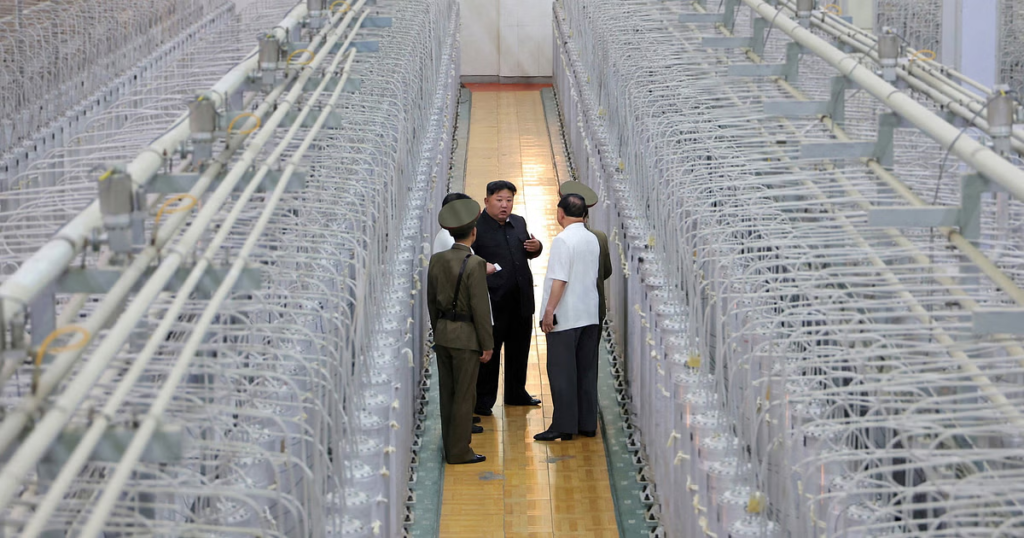North Korea has reiterated that its nuclear weapons are not meant for negotiations or diplomatic leverage but are instead designed for actual combat use.
This strong stance, conveyed through the state-run Korean Central News Agency (KCNA), reflects Pyongyang’s firm commitment to its nuclear program amid ongoing tensions with the United States and its allies.
This declaration follows Washington’s statement that it will continue to push for the complete denuclearization of North Korea. The regime in Pyongyang has made it clear that it does not intend to trade its nuclear arsenal for diplomatic or economic incentives, further escalating uncertainties in the region.
North Korea’s Justification for a Nuclear Arsenal
Country has consistently justified its nuclear weapons program as a necessary deterrent against perceived threats, particularly from the United States and South Korea.
According to KCNA, North Korea’s nuclear force is not intended as a tool for negotiations but rather as a strategic asset designed to eliminate threats from hostile forces. Pyongyang argues that its nuclear weapons serve as a guarantee of national sovereignty and security, preventing any potential military interventions or regime change attempts.
The Korean Peninsula has long been a hotspot of geopolitical tensions, with periodic escalations leading to military standoffs. Country believes that its nuclear weapons are the only means to ensure its survival in an international environment where, from its perspective, nations without nuclear capabilities have been vulnerable to external interventions.
The leadership in Pyongyang, particularly under Kim Jong Un, has frequently emphasized that the country will never follow the path of denuclearization unilaterally.
Read : South Korea Records Rise in Birthrate After Nine Years: 242,334 Babies Born in 2024
The United States, South Korea, and Japan have continually expressed concerns over Country’s nuclear ambitions, citing the risks posed to regional and global security.
Read : North Korea Sends Poop-Filled Balloons to South Korea: A New Low in Escalating Tensions
The international community, including NATO and the European Union, has repeatedly refused to recognize Country as a legitimate nuclear power. However, Pyongyang dismisses these concerns, asserting that its nuclear weapons are an indispensable component of its national defense strategy.
The Impact of North Korea’s Nuclear Policy on Diplomatic Relations
Country’s uncompromising stance on its nuclear program has complicated diplomatic efforts aimed at de-escalating tensions on the Korean Peninsula.
The U.S. has long pursued denuclearization talks with North Korea, particularly during the Trump administration, which saw unprecedented direct meetings between a sitting U.S. president and Kim Jong Un.
Trump’s visit to the demilitarized zone in 2019 was a historic moment, raising hopes for potential diplomatic breakthroughs. However, subsequent negotiations failed to produce tangible results, and North Korea has since resumed missile and nuclear tests.
Japanese Prime Minister Shigeru Ishiba recently reaffirmed Japan’s commitment to working closely with the U.S. to address the threat posed by North Korea’s nuclear and missile programs.

Japan sees Pyongyang’s nuclear capabilities as a direct threat, given its geographical proximity and historical tensions with North Korea. The recent missile launches, including what North Korea claims was the successful test of a solid-fuel intercontinental ballistic missile in 2023, have further heightened concerns in Tokyo and Washington.
North Korea’s leadership has dismissed international condemnations as baseless and hypocritical, arguing that countries such as the U.S. maintain vast nuclear arsenals while demanding denuclearization from Pyongyang.
The regime insists that any attempts to force it into negotiations through sanctions or diplomatic pressure will be futile. By framing its nuclear weapons as combat-ready rather than as bargaining chips, North Korea aims to dissuade any external actors from considering military options against it.
Potential Consequences and Future Outlook
North Korea’s position on its nuclear weapons has profound implications for regional stability and global security. The assertion that these weapons are intended for combat rather than diplomatic negotiations signals a more aggressive posture, raising fears of possible military confrontations in the future.
If North Korea continues to advance its nuclear and missile capabilities, it could trigger a regional arms race, prompting neighboring countries to enhance their own defense capabilities.
South Korea and Japan, both key U.S. allies, have increased their military cooperation with Washington to counter potential threats from North Korea.
The U.S. has reaffirmed its commitment to defending its allies in the region, with military drills and strategic deployments aimed at deterring North Korean aggression. However, these actions have often been met with further provocations from Pyongyang, perpetuating the cycle of escalation.

The broader international community remains divided on how to handle North Korea’s nuclear ambitions. While sanctions and diplomatic isolation have been the primary tools used against Pyongyang, they have not led to meaningful changes in its policies.
China and Russia, both influential players in the region, have taken a more cautious approach, advocating for dialogue rather than increased pressure. However, North Korea’s defiance complicates diplomatic efforts, making a peaceful resolution increasingly difficult.
Moving forward, the situation on the Korean Peninsula is likely to remain tense as long as North Korea maintains its hardline stance on its nuclear program.
While there is always a possibility of diplomatic re-engagement, Pyongyang’s assertion that its nuclear weapons are for combat rather than bargaining suggests that any future negotiations will face significant challenges.
The risk of miscalculations or accidental escalations remains a major concern, making crisis management and diplomatic engagement all the more critical in preventing conflicts in the region.

